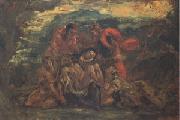Wholesale Oil Painting No Minimum |
|||||||||||
|
|
|||||||||||

|
|||||||||||
|
|
|
||||||||
Cosimo Tura1430-95 Italian Cosimo Tura Galleries Cosimo Tura (c. 1430 ?C 1495), also known as Il Cosm?? or Cosme Tura, was an Italian early-Renaissance (or Quattrocento) painter and considered one of the founders of the School of Ferrara. Born in Ferrara, he was a student of Francesco Squarcione of Padua. Later he obtained patronage from both Dukes Borso and Ercole I d'Este. By 1460, he was stipended by the Ferrarese Court. His pupils include Francesco del Cossa and Francesco Bianchi. He appears influenced by Mantegna's and Piero della Francesca's quattrocento styles. In Ferrara, he is well represented by frescoes in the Palazzo Schifanoia (1469?C71) . This pleasure palace, with facade and architecture of little note, belonged to the d'Este family and is located just outside the medieval town walls. Cosimo, along with Francesco del Cossa, helped produce an intricately conceived allegorical series about the months of the year and zodiac symbols. The series contains contemporary portraits of musicians, laborers, and carnival floats in idyllic parades. As in Piero della Francesca's world, the unemotive figures mill in classical serenity. He also painted the organ doors for the Duomo showing the Annunciation (1469). He collaborated in the painting of a series of "muses" for a studiolo of Leonello d'Este, including the allegorical figure of Calliope at the National Gallery (see image). While the individual attributions are often debated, among the artists thought to complete the Angelo di Pietro da Sienna, also called Maccagino or Angelo Parrasio, and Michele Pannonio. |
||||||||
|
|
||||||||
Pieta (mk05)
Pieta (mk05) Painting ID:: 20065 |
Wood 52 x 105 1/2''(132 x 268 cm)Entered the Louvre in 1863 Wood 52 x 105 1/2''(132 x 268 cm)Entered the Louvre in 1863 |
|||||||
|
|
||||||||
Eugene DelacroixFrench Romantic Painter, 1798-1863 For 40 years Eugene Delacroix was one of the most prominent and controversial painters in France. Although the intense emotional expressiveness of his work placed the artist squarely in the midst of the general romantic outpouring of European art, he always remained an individual phenomenon and did not create a school. As a personality and as a painter, he was admired by the impressionists, postimpressionists, and symbolists who came after him. Born on April 28, 1798, at Charenton-Saint-Maurice, the son of an important public official, Delacroix grew up in comfortable upper-middle-class circumstances in spite of the troubled times. He received a good classical education at the Lycee Imperial. He entered the studio of Pierre Narcisse Guerin in 1815, where he met Theodore Gericaul |
||||||||
|
|
||||||||
|
|
Pieta (mk05)
Pieta (mk05) Painting ID:: 20923 |
Canvas 12 x 17''(30 x 43 cm)Sketch fro the mural painting in the Church of Saint-Denis de Saint-Sacrement,Paris Commissioned in 1840 and completed in 1844;given in 1942 R.F 1943-6(MN) Canvas 12 x 17''(30 x 43 cm)Sketch fro the mural painting in the Church of Saint-Denis de Saint-Sacrement,Paris Commissioned in 1840 and completed in 1844;given in 1942 R.F 1943-6(MN) |
||||||
|
|
||||||||
|
Eugene Delacroix French Romantic Painter, 1798-1863 For 40 years Eugene Delacroix was one of the most prominent and controversial painters in France. Although the intense emotional expressiveness of his work placed the artist squarely in the midst of the general romantic outpouring of European art, he always remained an individual phenomenon and did not create a school. As a personality and as a painter, he was admired by the impressionists, postimpressionists, and symbolists who came after him. Born on April 28, 1798, at Charenton-Saint-Maurice, the son of an important public official, Delacroix grew up in comfortable upper-middle-class circumstances in spite of the troubled times. He received a good classical education at the Lycee Imperial. He entered the studio of Pierre Narcisse Guerin in 1815, where he met Theodore Gericaul Pieta (mk05) Canvas 12 x 17''(30 x 43 cm)Sketch fro the mural painting in the Church of Saint-Denis de Saint-Sacrement,Paris Commissioned in 1840 and completed in 1844;given in 1942 R.F 1943-6(MN) |
||||||||
|
|
||||||||
|
Prev Next
|
||||||||
|
|
||||||||
|
Related Paintings to Eugene Delacroix :. |
||||||||
|
|
||||||||
|
CONTACT US |


